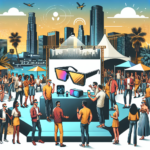Meta Launches the Revolutionary Orion AR Interface at Major Showcase
Exciting Insights into Meta’s Orion AR Glasses Prototype
Recently at Meta Connect 2024, hosted in September, Meta introduced a captivating video featuring the innovative Orion AR Interface designed for its AR glasses prototype. While Meta has indicated that the Orion will not be commercially available due to challenges in mass production, the company remains dedicated to creating AR glasses inspired by its research. The anticipated final product will likely showcase a narrower field of view compared to the prototype.
A Glimpse into the Orion Operating System
In preparation for the showcase, Meta developed a prototype operating system featuring an engaging user interface and essential applications. A brief video reveals the innovative Orion AR Interface along with several apps designed specifically for the prototype.
Realistic Visual Experience and Translucent Displays
An impactful highlight from the video is its portrayal of a realistic field of view, clearly demonstrating where the visuals taper off. Most virtual objects showcased appear translucent, offering an honest representation of the current display technology limitations.
Developer Perspectives on the Orion Experience
Developer Alex Coulombe, who provided firsthand insights on the Orion demonstration, reassured that the showcased video is more than just a concept. He pointed out that this effectively reflects the user experience expected with the prototype. The video presents at least six different app launcher main menu interfaces, suggesting that Meta might be exploring various design concepts or experimenting with different user interface strategies.
Why the Shift from Horizon OS?
Many may question Meta’s decision to forgo using Horizon OS, which powers Quest headsets, for the Orion. The reasons are straightforward:
- Divergent Product Categories: AR glasses represent a distinct product category from mixed-reality headsets. Their usage scenarios and design needs differ greatly from the primarily indoor stationery headsets.
- Performance Limitations: Meta’s Chief Technology Officer, Andrew Bosworth, pointed out that the computational requirements for Orion’s interface are roughly 10 times lower than those of the Quest. This substantial difference necessitates a more straightforward interface and less intricate applications. The Orion experience can be compared to earlier handheld systems, like the Gameboy Advance or a DS, rather than modern consoles.
Design Considerations for the Orion AR Interface
The necessity of an independent operating system becomes clear when considering these factors. Much like the iPhone doesn’t run macOS and the Apple Watch doesn’t run iOS, the underlying technology may overlap, but the applications and user experience differ greatly. The architecture of the apps and user interface must adapt to accommodate the compact and mobile nature of AR glasses.
Looking Ahead: Release Timelines and Future Innovations
Reports suggest Meta’s first consumer-focused AR product might be ready by 2027. In the meantime, the company will refine the interface and design methodologies suited to the unique characteristics of AR glasses. The aim is to transform the exciting concepts displayed in the Orion video into a sophisticated, user-friendly platform that could define the future of computing.
Anticipated Developments in AR Technology
As Meta continues to experiment with its Orion AR glasses prototype, fans can expect significant progress in AR technology and user experiences. The innovations nurtured through the Orion project could signal a pivotal moment in how we engage with augmented reality in our daily lives.
For AR technology enthusiasts, staying updated on Meta’s announcements and future advancements promises to be an exciting experience. The fusion of real and virtual worlds feels closer than ever, setting the stage for groundbreaking innovations that could fundamentally change how we interact with the digital landscape.
The Wider Impact of Augmented Reality Technology
AR technology holds the potential to transform numerous sectors, including education, healthcare, entertainment, and social interactions. As Meta and other tech companies focus on optimizing AR interfaces and applications, users can anticipate tools that not only enhance daily routines but also deliver a more intuitive and immersive experience.
Enhancing User Experience in the Orion AR Interface
The Orion AR Interface design will prioritize user experience. Developers will continually adapt and improve the interface based on user interactions and feedback, ensuring that the technology is accessible and enjoyable for a diverse audience.
Addressing Future Challenges in AR Development
Despite the promising outlook for AR technology, challenges persist. Striking a balance between performance, battery life, and design will be vital to developing a successful product. The ongoing efforts of developers and engineers will be crucial in overcoming these hurdles while fostering innovation and technological improvements.
As Meta advances with its Orion initiative and beyond, it seems poised to make substantial gains in the AR domain, enhancing not just its own product capabilities but also setting new industry standards for augmented reality experiences.




0 Comments